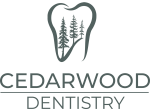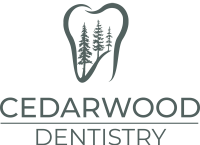At Cedarwood Dentistry, we’re both dental professionals and parents, so we know a major part of helping families build lifelong oral health is caring for baby teeth (sometimes called primary teeth).
While they may seem temporary, these early teeth set the stage for healthy adult smiles. Here are the reasons why baby teeth are so important, as well as the best ways parents can care for them at home and in the dentist’s chair.
Contents
- Why Baby Teeth Matter
- Key Milestones and When to Start Dental Visits
- How to Care for Baby Teeth at Home
- Common Concerns and Issues When Caring For Baby Teeth
- Visiting the Dentist: Our Gentle Approach
- Ties to the Midlothian Community
- Setting the Stage for a Lifetime of Healthy Smiles
- Ready to Help Your Child Thrive?
Why Baby Teeth Matter

There are many reasons why we pay close attention to the health of a child’s first set of teeth. In addition to keeping your child’s mouth healthy and free from pain, we can tell a lot about any future issues or concerns based on some key indicators in your little one’s baby teeth.
Baby Teeth Support Proper Jaw and Facial Development
Baby teeth help guide the growth of a child’s jaw and facial bones. As teeth erupt in a certain order, they ensure there’s adequate space for adult teeth later on. If a baby tooth is lost too early—whether due to decay or an accident—the surrounding teeth may shift and cause alignment challenges.
Healthy Teeth Promote Healthy Speech
Speech patterns and pronunciation rely heavily on baby teeth. Kids practice making different sounds by using their tongues against their front teeth. Healthy baby teeth help kids learn to speak more clearly and comfortably.
Good Dental Habits Can Encourage Good Nutrition
Chewing properly makes a big difference in how kids eat and absorb nutrients. Baby teeth break down food into digestible pieces, reducing the risk of digestive issues. When a child experiences pain or missing teeth, it can affect their ability (and willingness) to eat a balanced diet.
Taking Care Of Baby Teeth Lay the Foundation for Healthier Adult Teeth
Think of primary teeth as placeholders, reserving space for the permanent teeth to emerge. By keeping these placeholders healthy, you can often reduce or prevent crowding issues that might otherwise require orthodontic treatment later on.
Key Milestones and When to Start Dental Visits
- First Tooth: Typically appears around 6 months, though it can range anywhere from 4 to 10 months.
- Full Set of Baby Teeth: Most toddlers have a complete set of 20 primary teeth by about age 2 or 3.
As soon as you notice that first tooth, it’s an ideal time to schedule a dental visit—generally no later than their first birthday. At Cedarwood Dentistry, we use a gentle, child-friendly approach for these early visits. We might incorporate fun elements like a quick “chair ride” or let children safely explore certain tools (“show, tell, do”) so they feel excited about the dentist.
How to Care for Baby Teeth at Home
If this is your first baby, you undoubtedly have lots of questions about your baby’s teeth. Here are some things you can start doing at home to make sure your child has a lifetime of good dental health.
1. Brushing and Toothpaste
- For babies, wipe the gums with a soft, damp cloth before teeth even appear. This helps remove residue and introduces a habit of mouth cleaning early on.
- Once that first tooth emerges, use a child-sized soft-bristle toothbrush with just a thin smear of fluoride toothpaste.
- As they get older (around age 3), you can switch to a pea-sized dab of toothpaste if they can reliably spit it out rather than swallow.
2. Keeping Sugars in Check
- Avoid Sugary Drinks: Juice and sweetened drinks in a bottle or sippy cup can contribute to tooth decay (sometimes known as baby bottle decay). Water or plain milk is a better choice between meals.
- Watch Out for Bedtime Bottles: Sending kids to bed with a bottle of milk or juice bathes the teeth in sugar all night, making them more prone to decay.
3. Encouraging Fun Habits
- Make It a Game: Some parents use sticker charts or sing songs to time the two-minute brushing session.
- Model Behavior: Children love to copy grown-ups, so brushing your teeth side by side sets a good example.
Common Concerns and Issues When Caring For Baby Teeth
Navigating your child’s changing smile can feel overwhelming, but you don’t have to do it alone. At Cedarwood Dentistry, we’re parents too, so we share the practical tips that have proven effective for us and our patients. More importantly, we offer compassionate support to address challenges—like teething or early cavities—before they become bigger problems.
Rest assured, we’re here to guide you every step of the way, ensuring your child’s journey to a healthy smile is both comfortable and positive.
1. Teething Symptoms and Solutions
Many babies experience swollen gums and fussiness when new teeth erupt. Soothing methods include gently rubbing the gums with a clean finger, offering a chilled (not frozen) teething ring, or consulting with a pediatrician for further tips.
2. Early Cavities in Baby Teeth
Symptoms may include white spots, brown areas, or even small holes. If your child shows signs of decay, schedule a visit right away—early intervention is key to preventing bigger problems.
3. Thumb-Sucking or Pacifiers Impact on Teeth
These habits are very normal. Most children gradually stop on their own by ages 2–4. If a child continues beyond that age, we can discuss gentle ways to encourage other self-soothing methods while monitoring any potential effect on tooth alignment.
Visiting the Dentist: Our Gentle Approach
Children’s earliest memories of the dentist can shape their attitude toward oral health as they grow up. That’s why we focus on building trust from day one.
- Comfort-Focused Visits: At Cedarwood Dentistry, we prioritize a calm, positive environment. Our team is trained in techniques like “show, tell, do,” letting kids see, touch, and learn about the instruments we use.
- Family-Centered Care: We welcome parents to be part of the process—ask questions, watch demonstrations, and learn best practices for at-home care.
- Optional Sedation: If a child is especially anxious or needs a more complex procedure, we offer safe, gentle sedation options. This helps ensure they receive the care they need without fear or discomfort.
Ties to the Midlothian Community
We understand the busy routines of families in the Midlothian, Bon Air, and North Chesterfield areas—after-school sports, weekend errands, and never-ending to-do lists. By offering flexible scheduling and family-friendly amenities, we strive to make dental visits easier on parents and kids alike. Our goal is to provide top-notch care without creating extra hassle in your day.
Setting the Stage for a Lifetime of Healthy Smiles
Baby teeth might not last forever, but they shape the future of your child’s oral health. By starting early with gentle dental visits, good at-home care, and guidance from a supportive dental team, your child can grow up with strong, confident smiles.
If you have any questions or want to schedule an appointment to visit our Midlothian dental office, we’re here for you—offering the same comprehensive, compassionate approach we extend to every member of the family.
Ready to Help Your Child Thrive?
At Cedarwood Dentistry, we’re dedicated to giving families throughout Midlothian and beyond the tools and support they need for excellent oral health at every age. Let us know how we can help your family today or schedule a visit to see how we can keep your little one smiling for years to come.
Share the love!


